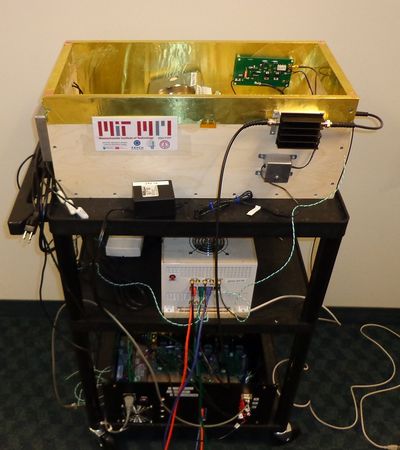Main Page
This Wiki is a resource for people who are assembling, programming, or using the instructional tabletop MRI scanner developed by a multi-institutional collaboration led by Larry Wald's group at the Martinos Center for Biomedical Imaging, Massachusetts General Hospital.
The scanner design is a low-cost resource for demonstrating concepts like magnetic resonance, spatial encoding, and the Fourier transform in an educational setting. The system was first used in MIT's undergraduate course 6.S02 - Intro to EECS II from a Medical Technology Perspective. Most of the components are open source designs.
The project was made possible through a collaboration between MGH, the Chinese Academy of Sciences (who built the magnets), Pascal Stang of Stanford University (who provided the MEDUSA console), and Maxim Zaitsev's group at the University of Freiburg (who designed the gradient coil traces). During fabrication we also benefited from access to the equipment and resources of the Center for Bits and Atoms at the MIT Media Lab.
The scanner design is described in a JMR paper [1] and also an abstract from the 2014 ISMRM conference.
First delivery to MIT: photo here Systems ready to roll out: photo here Students and faculty using the scanners in MIT 6.S02: photos here
Slides describing the tabletop scanner from the ISMRM 2014 Conference.
Introduction
Other low-cost tabletop imaging systems:
Desktop MRI system with 2 cm bore from Steve Wright's lab at Texas A&M.
Open Source Mobile MR Relaxometer from Mark Griswold's lab at Case Western.
Terranova-MRI earth's field system from Magritek.
MRIjx table top teaching system from Niumag in Shanghai.
Pure Devices 0.5T tabletop system from Würzburg, Germany.
Hardware
Sequences
Images
Lab Manuals + Course Notes
2015 Class
2013 Class
Contributors
This "crowd-sourced" MRI scanner has benefited from the skills and efforts of many people. We wish to acknowledge some of the key contributors below:
Overall project leadership: Lawrence Wald (MGH)
Lab documents and instructions: Lawrence Wald, Clarissa Cooley, and Elfar Adalsteinsson (MGH)
Advisors on technical and educational content: Elfar Adalsteinsson and Jacob White (MIT)
RF subsystem lead: Clarissa Cooley (MGH)
RF coil design/assembly: Azma Mareyam, Clarissa Cooley, and Cris LaPierre (MGH)
Gradient power amplifier design: V1: Thomas Witzel (MGH); V2: Nick Arango, Jacob White, Jason Stockmann, and Charlotte Sappo (MGH and MIT)
GUI software and sequences curator: Jason Stockmann (MGH)
Gradient wire pattern design: Feng Jia and Maxim Zaitsev (Freiburg)
Gradient coil fabrication and system mechanical integration: Cris LaPierre (MGH)
MEDUSA Console: Pascal Stang and Greig Scott (Stanford & Procyon Research)
Magnet design and construction: Yang Wenhui and Wang Zheng (Chinese Academy of Science - Beijing)
Projection reconstruction GUI: Erica Mason, Jason Stockmann, and ByungKun Lee (MGH and MIT)
HASTE spin echo train sequence: Jason Stockmann and Bo Zhu (MGH)
Slice-select GUI (work-in-progress): Melissa Haskell (MGH)
References
Consult the User's Guide for information on using the wiki software.
